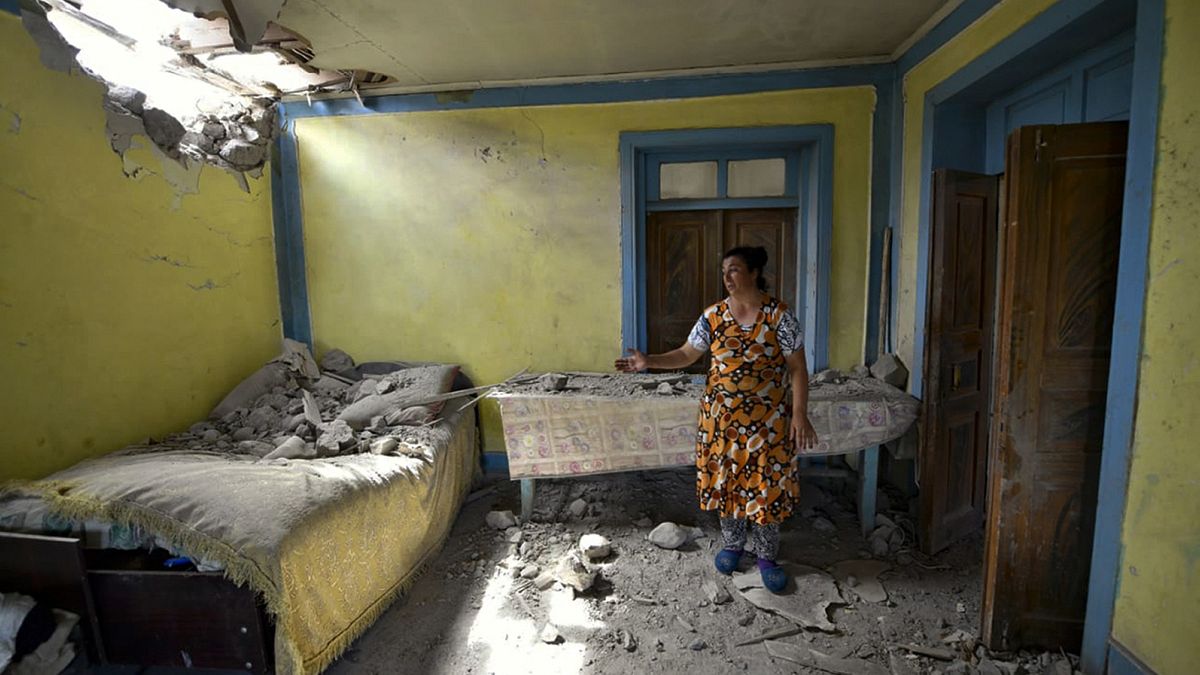The official death toll stands at 95, including civilians, as the fighting between Armenia and Azerbaijan continues.
Fighting between Azerbaijan and Armenian separatists in Nagorno-Karabakh continued into a third day on Tuesday amid international appeals for a ceasefire.
Azerbaijan and the forces of the separatist enclave - supported politically, militarily and economically by Armenia - have been involved in the deadliest flare-up of violence since 2016.
Armenia's defence minister said on Tuesday the separatists had destroyed 49 drones, four helicopters, 80 tanks, a military plane and 82 Azerbaijani military vehicles since Sunday, and said they had inflicted "heavy casualties".
The Armenian-backed Nagorno-Karabakh authorities say they have regained positions lost the day before, which Azerbaijan denies, claiming to have made further progress and destroyed "an Armenian motorised column and an artillery unit".
For its part, the Azerbaijani defence ministry said that "fierce fighting" continued until Tuesday morning and that its forces had "destroyed four enemy tanks, an armoured vehicle and killed ten soldiers.
The reported death toll from the fighting stood at 95 on Tuesday, according to reports by AFP, including 11 civilians: nine in Azerbaijan and two on the Armenian side. The real toll could be much higher, with both sides claiming to have killed hundreds of enemy soldiers.
The former Soviet states of Azerbaijan and Armenia fought a bloody war over the mountainous region of Nagorno-Karabakh in the early 1990s.
Thousands were killed on both sides. Hundreds of thousands of people were displaced.
The fighting has caused international concern, with Russia, France and the United States - the three mediators in the Minsk Group - calling for an immediate ceasefire.
The UN, Germany, Turkey and the UK have also joined calls for the cessation of hostilities.
German Chancellor Angela Merkel spoke with the president of Azerbaijan, Ilham Aliyev, and the prime minister of Armenia, Nikol Pashinyan, by phone, urging both to commit to an immediate ceasefire and to return to the negotiating table, government spokesman Steffan Seibert confirmed on Twitter on Tuesday.
In a joint statement, the UK Foreign Secretary Dominic Raab and Canadian Foreign Minister François-Philippe Champagne said: "Canada and the UK are deeply concerned by reports of large scale military action along the Line of Contact in the Nagorno-Karabakh conflict zone.
"Reports of shelling of settlements and civilian casualties are deeply concerning. We call for the immediate end of hostilities, respect for the ceasefire agreement, and the protection of civilians."
On Monday, Turkish President Recep Tayyip Erdoğan called on Armenia to end the "occupation of Nagorny Karabakh" and promised that Ankara would remain "at the side" of Azerbaijan "by all means".
Armenia and Nagorny Karabakh accuse Ankara of supplying arms, "military specialists", drone pilots and aircraft to Baku, which Azerbaijan denies.
Russia maintains good relations with both. However, it remains closer to Armenia, which belongs to a Moscow-dominated military alliance.
The UN Security Council will meet on Tuesday at 11 pm CEST behind closed doors to discuss the situation.
